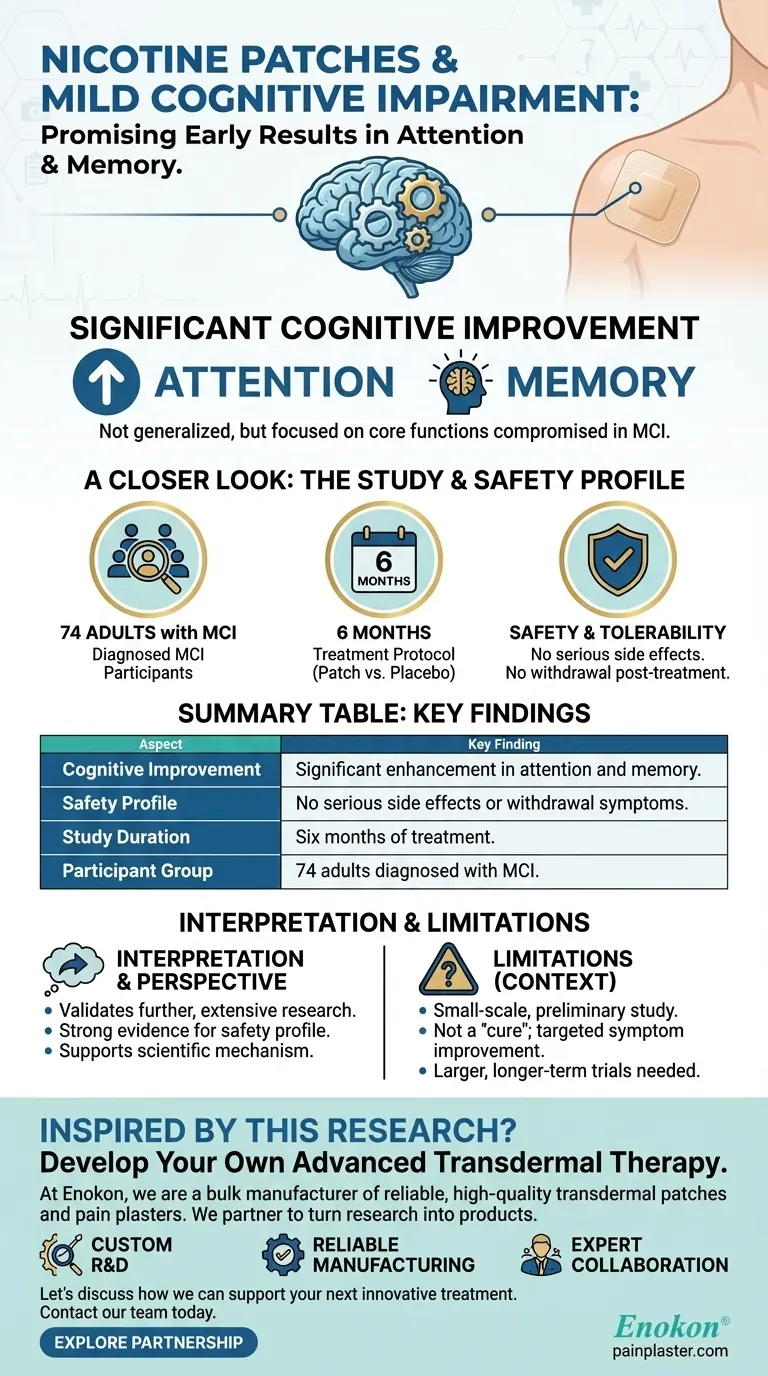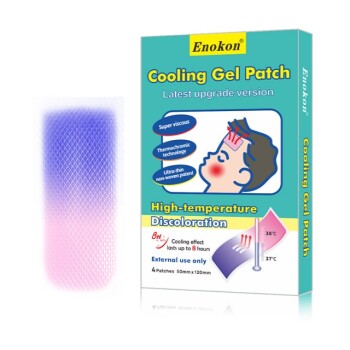In the initial study involving 74 adults with Mild Cognitive Impairment (MCI), participants who used a nicotine patch for six months demonstrated a notable improvement in both attention and memory. Crucially, this was achieved without causing any serious side effects or observable signs of withdrawal after treatment.
The core finding of this earlier research was that transdermal nicotine showed significant promise as a safe and effective intervention for enhancing key cognitive functions that are specifically impaired by MCI.

A Closer Look at the Key Findings
To fully grasp the study's importance, we must break down its primary outcomes. The results center on two areas: cognitive enhancement and patient safety.
Cognitive Domain Improvements
The study identified improvements in very specific cognitive areas. The benefits were not a generalized enhancement but were focused on attention and memory. These are core functions often compromised in the early stages of cognitive decline, making these findings particularly relevant.
Treatment Protocol
The research was conducted over a six-month period, a significant duration for observing meaningful change. Participants were given either a nicotine patch or a placebo patch, establishing a controlled environment to measure the true effect of the nicotine itself.
The Study Population
The trial specifically involved 74 adults who had already been diagnosed with MCI. This focus ensures the results are directly applicable to the target patient group struggling with this specific condition.
Evaluating Safety and Tolerability
For any potential treatment, especially for a vulnerable population, the safety profile is as important as the efficacy. The study provided reassuring data on this front.
Absence of Serious Side Effects
A critical outcome was the lack of any serious adverse events reported among the participants using the nicotine patch. This suggests that, under the study's controlled conditions, the treatment was well-tolerated.
No Evidence of Withdrawal
Perhaps the most significant safety finding was the absence of withdrawal symptoms after the six-month treatment concluded. This addresses a primary concern associated with nicotine and indicates that therapeutic, medically-supervised use did not lead to dependence in this context.
Understanding the Study's Limitations
While promising, it's essential to view these results within their proper scientific context. This was a foundational study, not a final conclusion.
A Preliminary Step
With only 74 participants, this is considered a relatively small-scale study. Its results are powerful enough to justify further research but are not definitive on their own.
Specificity of the Findings
The study showed improvement in attention and memory, but it does not suggest that nicotine is a "cure" for MCI or that it reverses the underlying condition. The benefits were targeted to specific symptoms.
The Need for Larger Trials
The success of this initial research serves as a proof of concept. It establishes the need for larger, longer-term clinical trials to confirm these findings in a more diverse population and to better understand the long-term effects.
How to Interpret These Results
Based on the evidence from this study, we can draw clear, actionable conclusions for different perspectives.
- If your primary focus is on potential MCI treatments: This study validates transdermal nicotine as a legitimate candidate for further, more extensive investigation.
- If your primary focus is on patient safety: The results provide strong preliminary evidence that medically supervised nicotine patch use has a favorable safety profile for this specific group, especially regarding the low risk of dependence.
- If your primary focus is on the scientific mechanism: This research supports the hypothesis that stimulating nicotinic acetylcholine receptors in the brain can produce tangible cognitive benefits for individuals with MCI.
This foundational study provided the critical evidence needed to justify a deeper exploration of nicotine as a therapeutic tool against cognitive decline.
Summary Table:
| Aspect | Key Finding |
|---|---|
| Cognitive Improvement | Significant enhancement in attention and memory. |
| Safety Profile | No serious side effects or withdrawal symptoms post-treatment. |
| Study Duration | Six months of treatment with a nicotine patch. |
| Participant Group | 74 adults diagnosed with Mild Cognitive Impairment (MCI). |
Inspired by this research? Develop Your Own Advanced Transdermal Therapy.
This study highlights the significant potential of transdermal patches for targeted therapeutic delivery. At Enokon, we are a bulk manufacturer of reliable, high-quality transdermal patches and pain plasters. We partner with healthcare and pharmaceutical distributors and brands to turn promising research into tangible products.
Benefit from our expertise:
- Custom R&D: Our technical team can help you develop and refine transdermal formulations for specific active ingredients and therapeutic goals.
- Reliable Manufacturing: We ensure consistent, high-volume production of patches that meet stringent quality standards.
- Expert Collaboration: Work with us to navigate the complexities of product development, from concept to market.
Let's discuss how we can support your next innovative treatment. Contact our team today to explore a partnership.
Visual Guide

Related Products
- Heating Pain Relief Patches for Menstrual Cramps
- Menthol Gel Pain Relief Patch
- Asthma Cough and Pain Relief Patch for Adults and Kids
- Far Infrared Heat Pain Relief Patches Transdermal Patches
- Far Infrared Deep Heat Relief Patches Medicated Pain Relief Patches
People Also Ask
- How can someone switch to HRT patches from another form of HRT? A Guide to a Smooth Transition
- How often should HRT patches be changed? Optimize Your Hormone Therapy Schedule
- Can heating pads be used with pain patches? Risks & Safety Tips
- Can daily activities like bathing, swimming, or exercising affect HRT patches? Key Insights for Patch Longevity
- How does the Deep Heat Back Patch work? A Drug-Free Solution for Targeted Pain Relief















